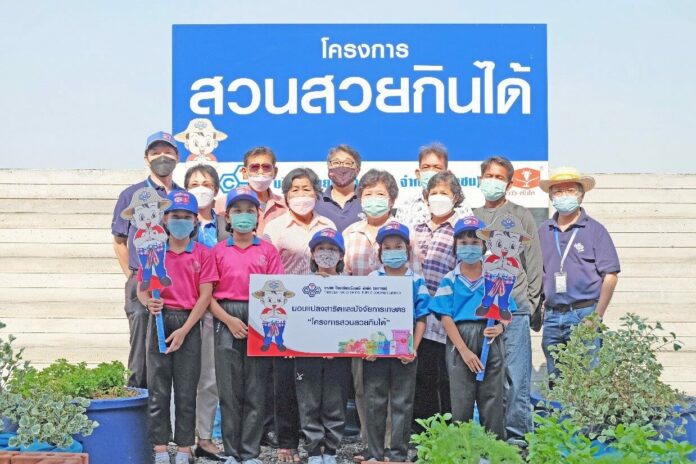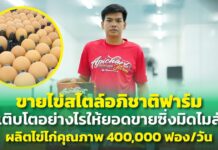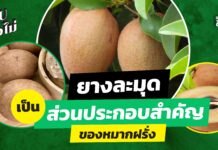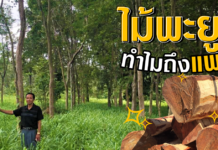| เผยแพร่ |
|---|
บมจ.ไทยเซ็นทรัลเคมีฯ สานต่อโครงการสวนสวยกินได้ ปีที่ 5 เดินหน้าส่งเสริมความรู้ด้านการเกษตร และการใช้ปุ๋ยเคมีที่ถูกต้องให้กับเยาวชนไทย
นายมุเนทาเคะ คาวาคิตะ (กลาง แถว 3) เจ้าหน้าที่บริหารและผู้ช่วยกรรมการผู้จัดการใหญ่ บริษัท ไทยเซ็นทรัลเคมี จำกัด (มหาชน) ผู้ผลิตและจำหน่ายปุ๋ยเคมีรายใหญ่ในประเทศไทย ภายใต้ตราสินค้าหัววัว-คันไถ ตราสิงห์ ตราเด็กน้อย และตราทีซีซีซี เป็นตัวแทนมอบแปลงสาธิตและปัจจัยทางการเกษตรในโครงการสวนสวยกินได้ให้แก่โรงเรียนวัดนาอุ่น อำเภอภาชี จังหวัดพระนครศรีอยุธยา โดยมี นางชลาไล ไชยชมภู (ที่ 1 ทางซ้าย แถว 2) ผู้อำนวยการโรงเรียนเป็นผู้รับมอบ และนอกจากนี้ ยังได้รับเกียรติในการสนับสนุนโครงการจากหลายๆ ภาคส่วน อาทิ นางสาวจินตนา ศักดิ์เจริญชัย (ที่ 2 ทางซ้าย แถว 2) เจ้าของร้านโรงสี จังหวัดเจริญวัฒนา ประธานและคณะกรรมการสถานศึกษา กำนันตำบลไผ่ล้อม ผู้ใหญ่บ้านหมู่ที่ 2 และหมู่ที่ 3 มาร่วมงานในครั้งนี้ด้วย
โครงการสวนสวยกินได้ เป็นโครงการที่บริษัท ไทยเซ็นทรัลเคมีฯ จัดอย่างต่อเนื่องเป็นปีที่ 5 ปัจจุบันมีโรงเรียนที่เข้าร่วมโครงการจำนวนทั้งหมด 8 โรงเรียน ซึ่งโรงเรียนวัดนาอุ่นถือเป็นโรงเรียนลำดับที่ 9 โดยวัตถุประสงค์ของโครงการสวนสวยกินได้นั้นก็เพื่อมอบความรู้ความเข้าใจที่ถูกต้องเกี่ยวกับการเพาะปลูก ตั้งแต่ความรู้พื้นฐานจนถึงขั้นตอนปฏิบัติให้แก่นักเรียนระดับชั้นประถมศึกษา โดยเริ่มจากการเพาะเมล็ดพันธุ์ การดูแล การใส่ปุ๋ยอย่างถูกวิธี เพื่อเพิ่มผลผลิตในการเพาะปลูก ทั้งนี้ บริษัทมุ่งหวังว่าโรงเรียนที่เข้าร่วมโครงการจะสามารถนำผลผลิตที่ได้ นำไปใช้ให้เกิดประโยชน์ให้แก่นักเรียนในโครงการอาหารกลางวัน และส่วนที่เหลือสามารถนำไปขายเพื่อนำเงินมาต่อยอดในโครงการและสร้างรายได้ให้แก่โรงเรียนได้อีกด้วย โดยรูปแบบจะมีทั้งการสอนในห้องเรียน มีกิจกรรมเล่นเกมตอบคำถามแจกของรางวัล และการฝึกปฏิบัติจริงที่แปลงปลูกผักที่บริษัทได้มอบให้กับทางโรงเรียน บริษัทหวังเป็นอย่างยิ่งว่าโครงการสวนสวยกินได้จะสามารถฝึกทักษะให้นักเรียนในการปลูกพืชผักสวนครัวได้รู้จักการดูแลรักษาและเก็บเกี่ยวผลผลิต รวมถึงการจัดจำหน่ายผลผลิต การจัดทำบัญชีรายรับ-รายจ่าย ทำให้นักเรียนสามารถมีรายได้ระหว่างเรียน และเป็นแหล่งเรียนรู้ในการเพาะปลูกผักสวนครัวตามหลักปรัชญาของเศรษฐกิจพอเพียงในชุมชนได้อย่างยั่งยืน
Thai Central Chemical Public Company Limited continued “The Edible Vegetable Garden Project Season 5”, moving forward to encourage agricultural knowledge and correct usage of chemical fertilizer among Thai youths.
Mr.Munetake Kawakita (Middle of third row) – Executive Officer & Senior Vice President of Thai Central Chemical Public Company Limited (TCCC), leading high quality NPK compound fertilizer producer and distributer of chemical fertilizer in Thailand under OX-Brand, Baby, Singha and TCCC Brand, presented the demonstration plot and agricultural equipment under the Edible Vegetable Garden Project to Wat Na Un School, received by Mrs.Chalalai Chaichompoo (1st Left of second row) – School Director. In addition, honored by Ms.Chintana Sakcharoenchai (2nd Left of second row) – Jor Charoen Wattana Rice Mill, Chairman and Directors of the Board of Education, Pailom Subdistrict Headman, Village Headman Moo 2 and Moo 3 were also invited to participate in this activity.
The Edible Vegetable Garden Project is an ongoing project organized by TCCC for the 5th consecutive year. At present, there are a total of 8 schools participating in the project, and Wat Na Un School is the 9th school. The objectives of the Edible Vegetable Garden Project are to provide the correct knowledge and understanding of basic agriculture, from basic knowledge to practical procedures for primary school students, starting with sowing seeds, cultivation, and fertilization properly to increase the productivity. In addition, TCCC hopes that the schools participating in this project will be able to use the products to benefit students in the lunch program, and the surplus products will be able to be sold in order to raise funds for the project and generate income for the school as well. In the classroom, there are activities to play games, answer questions, give away prizes and do practical training at the demonstration plot that the company has given to the school. TCCC sincerely hopes that the Edible Vegetable Garden Project will be able to practice skills for students to grow home-grown vegetables, maintain and harvest, including the products distribution and accounting of income-expenses, and make students earn money while studying, moreover, this project will be a learning center for cultivating vegetable gardens according to the philosophy of sufficiency economy in the community in a sustainable way.






